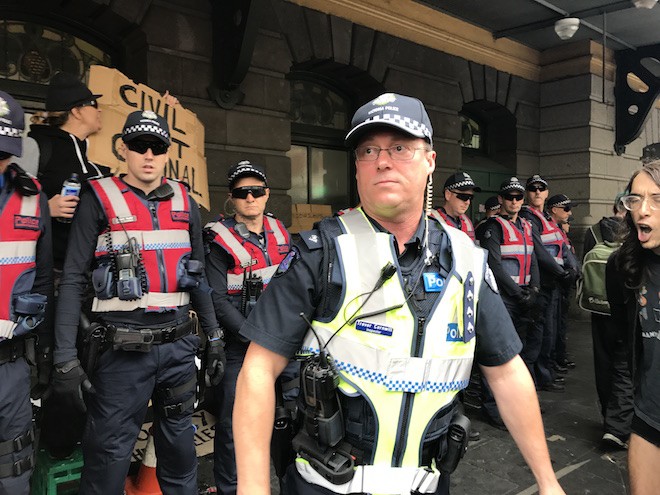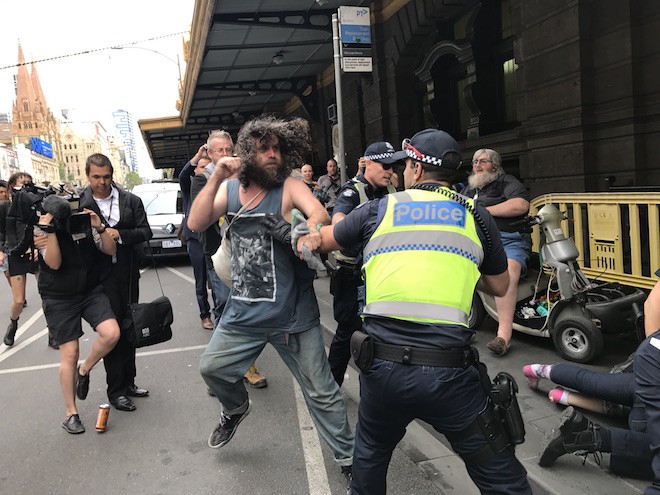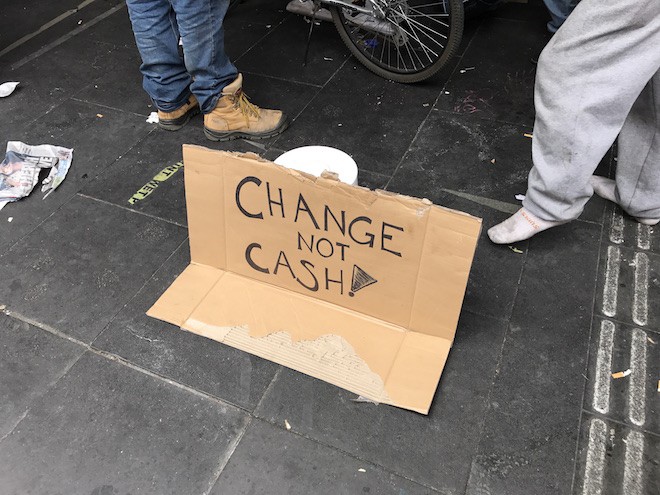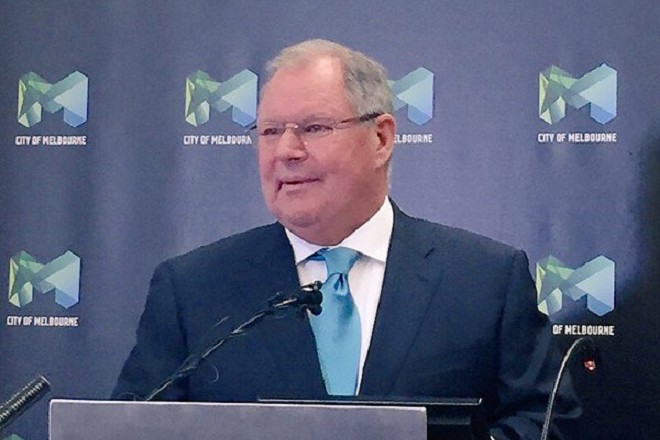“It Was Basically A PR Stunt”: The Full Story From Melbourne’s Homeless Clash Yesterday
"There’s been no help for these people whatsoever. It’s rubbish. There’s no dialogue at all."

Yesterday afternoon a small army of police descended on Flinders Street, Melbourne to clear a homeless encampment and the frustration from all sides reached its boiling point. I stood for a while on the periphery of the camp and watched activists chant while police slowly and meticulously set their formations. A man in his thirties shoved past me and began yelling at some homeless people. “Get off the fuckin’ streets you bums ya’ve been offered housin’”.
His display lasted all of five seconds before he scuttled off down Flinders Street, but many share his sentiments. It was widely reported last week that the Victorian Government announced a $9.8 million package to build 30 new modular homes and help 40 people sleeping rough into transitional housing. What was not so widely reported, however, was that the housing offers didn’t actually reach the people sleeping outside Flinders Street Station.
After speaking to a handful of rough sleepers and some activists I watched more people gather to have a chat and see what was going on. The protest was spontaneous and three distinctive groups emerged. The police, so cold and professional in demeanour, seemed ready for all-out battle. The activists, growing more desperate and shrill, threw one last Hail Mary pass to no avail. The homeless were caught in the middle, unsure of their future, and faced with a lot of angry people who felt they were doing ‘the right thing’.
Breaking: Heavy police squad moving into homeless Camp on Flinders Street @abcnews @abcnewsMelb pic.twitter.com/1hJUzOe5Ob
— James Dean (@JamesDeanNOW) February 1, 2017
Inside The Protest
Emily Angelidis, an activist who had been at the encampment for the past week, was one of the first people to tell me “the offers of help from the government never actually reached anybody here”. Though Melbourne City Council reportedly gave people 24 hours notice that they would have to ‘move on’, it seems alternatives were not made clear. “Only a few minutes ago they’ve received offers of three-day crisis accommodation in the Coburg Motor Inn, which is bullshit,” she said as she placed a picket sign on the ground.
Another activist told me that, although the temporary accommodation on offer is free, that will only be the case for the first three days, after which time anybody wishing to stick around will need to fork out $65 a night. After three days of crisis accommodation, virtually all of the homeless people are back on the street.
“It was basically a PR stunt,” Emily said, frustrated, as she picked up her sign once more. “The only offer for housing has come now, just 20 minutes before police will come in and arrest anybody who refuses to move — there’s been no help for these people whatsoever. It’s rubbish. There’s no dialogue at all. It’s disgusting that activists have to come down and force the police to have a dialogue with them and treat them on the level of equal human beings. If we weren’t here, they would’ve just come in and taken all their stuff and kicked them out.”
Kelly Whitworth, from the Homeless Person’s Union, said last week’s announcement was an empty claim of support to swing public opinion onto the police’s side. “I think it was to appease a concerned public,” she said. “The accommodation that is on offer is not a fit place for people to live. They’re expensive, they’re extremely dangerous, they’re not places where people can heal from their trauma and they’re temporary — you’re back out on the streets in a week, so it’s no solution. What people really need is permanent, secure, affordable, long term, public housing.”
Kelly tells me that the temporary accommodation often provided to the homeless frequently leaves them crammed in small confines and mixed in with people coming straight out of jail, sometimes placing them in the line of direct violence, as cases in the past have illustrated. “They pay about $230 a week for the privilege. This is why they often choose to sleep on the streets.”
Cathryn Murdoch, also from the Homeless Person’s Union, says what the government is doing is worse than a band-aid solution. “You can actually be taking someone with an existing mental illness or who is extremely traumatised, or who’s on the street because they’ve left domestic violence and then you’re putting them into an unknown, unsafe environment.
“Some people are refusing that because if they’re in community they’re safe; people know them, they know their story. They’re being separated from their family all over again and they don’t know what they’ll encounter. Their room could be bashed down in the middle of the night, they could be mixed in with people who might have drug and alcohol addiction, domestic violence offenders… all sorts of dangerous unknown characters. This is why they want to stay; they’ve formed a family here.”

Link, pictured above, is deaf. Conversation with him involves a back and forth exchange of pen and paper. He’s one of the friendliest blokes I have ever come across, but even his patience wore thin yesterday. His multiple pleas for an interpreter, expressed to the police via the Homeless Person’s Union, were continually ignored.
For many, this seemed to be the prevailing theme of the day from police; multiple attempts by homeless people to communicate were met with deaf ears.
Solutions For The “Serial Pests”
In the end, five people were arrested — reports indicate this included four protesters accused of violence and disorderly conduct and one homeless person for public drunkenness. Some homeless people did become aggressive, and I saw more than one get dragged into a police car. This has coloured the front pages of this morning’s papers; The Herald Sun has called them “ferals” and “serial pests”.
From where I stood they didn’t seem all that unreasonable. People were backed into a corner and spoken about, and not to. It’s hard to imagine it coming to this if they were treated with dignity and respect at the start. But yesterday wasn’t really the start. This tension has been mounting for a long time and hit a high around the start of the Australian Open — when the world’s eyes were fixed in our direction.
There are more than 80,000 empty properties in Melbourne — about 4.8 percent of the city’s total housing stock — and more than 32,000 people on the state’s public housing list. Surely we can offer help to people more than 20 minutes before the riot police arrive. We’re all just a few wrong moves away from sleeping on the streets.

–
All photos via David Allegretti.
–
David Allegretti very much enjoys converting oxygen to carbon dioxide. You may remember him from such publications as VICE, The Age, and Global Hobo. Tweet him banana bread pics at @davidallegretti.



